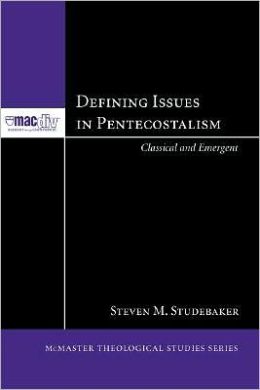Steven Studebaker: Defining Issues in Pentecostalism
 Steven M. Studebaker, ed., Defining Issues in Pentecostalism: Classical and Emergent, McMaster Theological Studies Series 1 (Eugene, Oregon: Wipf and Stock, 2008), 207 pages, ISBN 9781556358432.
Steven M. Studebaker, ed., Defining Issues in Pentecostalism: Classical and Emergent, McMaster Theological Studies Series 1 (Eugene, Oregon: Wipf and Stock, 2008), 207 pages, ISBN 9781556358432.
Studebaker brings together a number of significant points of discussion from a forum on Pentecostal theology held at McMaster Divinity College in 2007. The impressive list of participants includes among others Clark Pinnock, Frank Macchia, Amos Yong, and Roger Stronstad, all well-known contributors in the discussion of Pentecostal topics. This collection describes itself as an introduction to classical doctrines of Pentecostalism and significant contemporary debates. The list of topics is divided into issues concerning theological and biblical studies, the former including Spirit baptism (Macchia), theology of the religions (Yong), theology of grace (Studebaker), and divine attributes (Gabriel), the latter addressing the charismatic theology of Luke (Stronstad), Pauline Theology of the Spirit (Westfall), and a discussion of the Spirit and suffering (Mittelstadt). An epilogue by Clark Pinnock and a study guide on Pentecostal resources complete the volume.
In many ways, this collection is a trailblazer for the rapid development of Pentecostal theology. Comprehensive studies on Pentecostal thought and praxis have been introduced to the market only in the last three decades, and only the last few years have shown a concerted effort among Pentecostals and the wider ecumenical community to come to terms with the issues that define Pentecostalism. In that sense, Studebaker does not aim at a comprehensive collection in this volume but rather at a concise approach to the issues that have influenced the formation of Classical Pentecostalism and that continue to shape the Pentecostal movement in its global dimensions.
This tension between the established North American origins of the Pentecostal movement and the diversity of global manifestations of Pentecostalism worldwide gives life to this collection of essays. The label “introduction” is applicable to this collection insofar as many of the essays initiate a conversation that the authors have engaged already on a much broader level in their academic publications. Macchia’s essay, for example, opens up to a wider discussion in his book, Baptized in the Spirit, Yong has addressed the question of a theology of religions in a number of his monographs, and Stronstad’s essay is a revisiting of his original thesis on the charismatic theology of Luke’s Gospel. Those who have not yet read these texts or have been hesitant to approach the more academic discussion will find in this volume a welcome initiation to some of the central themes.

Steven M. Studebaker is Associate Professor of Systematic and Historical Theology at McMaster Divinity College.
On the other hand, it is also the essays of emerging young scholars that breathe life into the collection. Studebaker’s own contribution to a Pentecostal theology of grace is an excellent example of the new Pentecostal scholarship that has begun to emerge in recent years. His essay not only speaks of personal experience but engages the Pentecostal self-understanding in an informed dialogue with other theological traditions. Studebaker’s own theological training at a Catholic institution (Marquette University) reflects the maturing of Pentecostal scholars who are willing and able to engage theological issues with an informed, ecumenical perspective that does not shy away from the historical and philosophical contexts that have shaped the debate. At the same time, many of the authors are frank in their criticism of their own Pentecostal tradition and urge Pentecostals on to develop a more comprehensive and engaging theology that overcomes internal Pentecostal debates. The essays in this volume are far from short-sighted. And it is perhaps the far-sighted vision of the authors that presents a weak point in the collection.
Category: In Depth, Spring 2009


